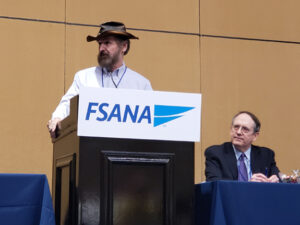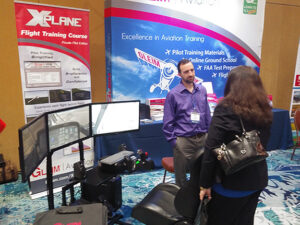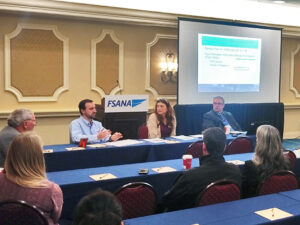
Orlando, FL – The Flight School Association of North America (FSANA) held its annual Flight School Operators Conference on February 13-15 at the Rosen Plaza Hotel. More than 200 people representing flight schools, training centers, manufacturers, and suppliers from around the country attended the event to discuss the flight training industry and share information and resources.
The event marked the 10-year anniversary of FSANA, which was founded in 2009 with the mission of supporting, promoting, and advocating for the business of flight training. Opening remarks from FSANA Founder and CEO, Robert Rockmaker, provided a glimpse into the history of the organization and a call to attendees to be open about sharing information. Indeed, the many panels, sessions, and breaks facilitated opportunities to network and discuss solutions. By the end of the event, hundreds of notebooks emblazoned with the Rosen Hotels logo were full of ideas to implement after operators returned from the trip.

Exhibits showcased solutions to help flight schools operate more efficiently while providing new training solutions for students and career advancement pathways for pilots, mechanics, and support personnel. Gleim Aviation exhibited at the event and participated in a number of seminars and panels to offer support for growing flight schools and for those adding new services. Attendees were also able to connect with exhibitors representing high-end flight simulator manufacturers, discover new options for pilot financing, and learn about the AOPA You Can Fly program. Several airline representatives joined the exhibitors to network with flight schools and develop feeder programs and training agreements.

Gleim Chief Instructor, Paul Duty, along with FAA Aviation Safety Inspector, Louie Hilliard, and King Schools Business Development Leader, Pam Olsen, conducted one of the first sessions covering Part 141 certification and pitfalls. Duty discussed various resources available to flight school operators to assist them in the certification process. Olsen discussed a number of reasons why Part 141 certification is important. Hilliard shared examples of the mistakes that operators often make while navigating through the approval process. Everyone in attendance received a step-by-step guide from Gleim Aviation outlining the process and available resources, including the free Gleim TCO tool. If you are interested in learning more about approval, you can contact our team of Aviation Training Consultants to start a dialogue for individualized support.
Gleim Assistant Chief Instructor, Karl Winters, joined Duty at a flight school workshop that opened the floor to schools requesting help with a variety of problems. One attendee recently purchased a flight school and wanted to learn about standardizing the school’s curriculum. Solutions from the workshop centered around using a commercially available syllabus.

“There is no point in reinventing the wheel,” said Duty, as others agreed. Others pointed out how using a syllabus along with electronic tracking software helps tie together the various resources that students use, making the instructor’s job effortless to conduct pre- and post-flight briefings, assign homework, and track training activities.
Another popular topic shared by helicopter training centers discussed how to add fixed-wing training to their services. Operators of fixed-wing flight schools were surprised to learn about the disparity in some of the cost drivers at rotocraft schools, such as insurance deductibles and maintenance expenses. These costs, along with the available career pathways for students, were the main factors driving school owners to investigate more diversified services. Flight schools looking to expand their fleets discussed several aircraft leasing services and important factors for using such services.
In another session, flight school owners discussed the idea of adding a flight simulator to their fleet with representatives from Alsim, Frasca International, and One-G Simulation. One question posed was simply, “Why should flight schools buy a simulator?” Many benefits were discussed, but ultimately it was agreed that purchasing a flight simulator offers a good return on investment by creating a more suitable and affordable learning environment for students to grasp a concept before investing time and money in an aircraft.
General aviation simulator use was then compared to that of the military and airlines, which train in simulators before progressing to aircraft. The discussion concluded that general aviation should put more emphasis on the use of simulators. Instead of flight schools limiting their students’ simulator time to the 2.5 hours that can be credited toward a private pilot certificate, the simulators should be used as much as necessary, and time in the actual aircraft should be limited to meet the minimum hours. This approach decreases costs for the student, encourages course completion, and increases the overall profit of the flight school by retaining more students. Flight schools can make sure that simulator instruction is deeply integrated into their curriculum by following a syllabus to prepare students in the same manner that they would approach their flight training.

Awards were presented to recognize the accomplishments made by several long-time FSANA members, supporters, and industry advocates. Following the awards, FAA WINGS Industry Advisory Committee Chairman, Paul Berger, announced the winners of the 2018 WINGS Flight Training Challenge Sweepstakes, which included a total of $10,000 in cash prizes. The sweepstakes program is sanctioned by the FAA with the goal of increasing awareness of and participation in the WINGS program. The belief is that pilots who complete WINGS phases are safer aviators. Berger also announced that the sweepstakes, which is supported by Gleim Aviation, is now open to all pilots who participate in the FAA WINGS Pilot Proficiency program.
 One of the great benefits that FSANA provides is AeroCamp. These camps are designed to give young people a unique opportunity to explore the vast and exciting world of aviation and aerospace at their local airport through FSANA members. Literature was distributed to schools interested in starting their own camp.
One of the great benefits that FSANA provides is AeroCamp. These camps are designed to give young people a unique opportunity to explore the vast and exciting world of aviation and aerospace at their local airport through FSANA members. Literature was distributed to schools interested in starting their own camp.
“Campers learn firsthand about the dynamics of airplanes and flight and about the broad spectrum of careers in the aviation and aerospace industry,” according to FSANA. “Every camper is given the opportunity to fly an aircraft if they choose to. However, flight time is only a fraction of the AeroCamp experience and is not required to have a great learning adventure. AeroCamp also includes site visits to various aviation-related organizations.”
A list of AeroCamp participating flight schools can be found online.
Gleim would like to thank the FSANA Board of Directors and congratulate the organization on 10 years of success. As a proud supporter of FSANA, we encourage flight schools to become members of the organization and join in supporting the flight training industry. The 2020 Flight School Operators Conference will be held in Las Vegas, NV, next February. For more information, visit FSANA online.

